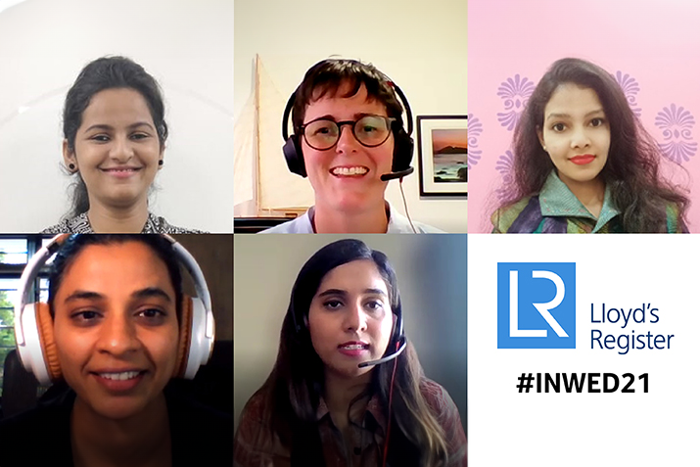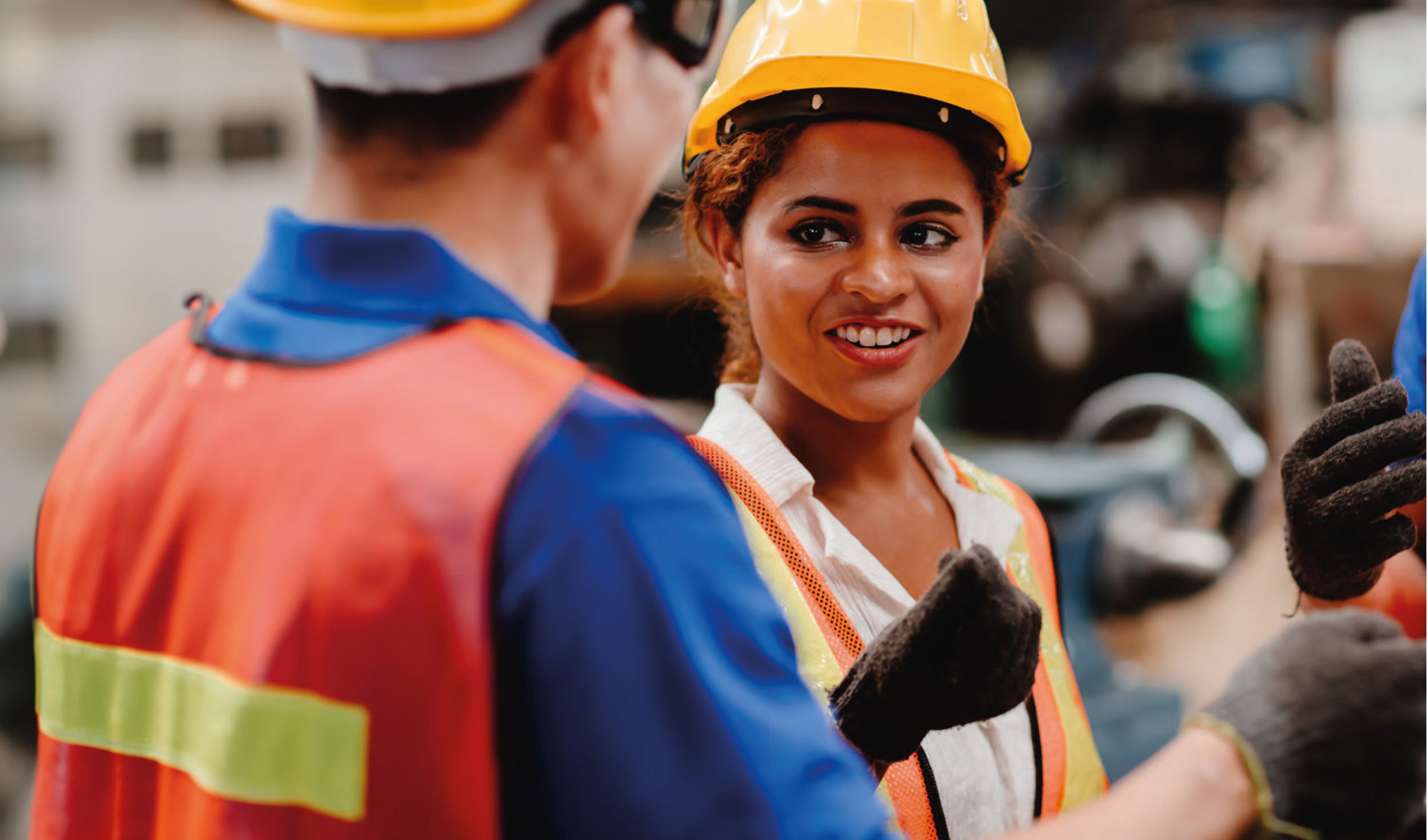To mark International Women in Engineering Day on 23 June, we spoke to five LR colleagues in South Asia about their experiences of being women in technical roles, how LR compares to other companies and what needs to be improved.
Our contributors:
- Sayali Khopde, Worldwide Inspection Coordination Engineer, Mumbai (top left)
- Shradha Worlikar, Assistant Specialist, Mumbai (top right)
- Srishti Jain, Assistant Specialist, Mumbai TSO (bottom middle)
- Joanna Mycroft, Senior Surveyor, Singapore (top middle)
- Dipali Kuchekar, Autonomous Ships and Systems Project Manager, Singapore (bottom left)

“In Singapore it is unusual to have a woman in a technical role in the Maritime Industry. Many of the shipyard workers and superintendents have expressed surprise when I turn up. One day at the yard I got excited because there were two other women in overalls. That was a record! This will only change when the whole industry provides more opportunities for women.”
What made you choose a career in engineering/a technical field?
Sayali: Engineering is the field that solves the most impactful of our problems in the world. I chose Mechanical Engineering because everyone says it is the mother of all engineering. I was the only girl out of 60 students and graduated with distinction, which was the proudest achievement for me.
Shradha: I was always interested in science and curious to learn how things work, so I chose to pursue an electrical engineering diploma. My father is my role model and always supported me. He was from a mechanical background but early in my engineering career, he taught me the basics.
Srishti: I was a bright student in school. The working of machines and automobiles always excited me. Hence, I chose mechanical engineering despite resistance from a lot of people as it is still considered to be for boys!
Joanna: I was sailing with my grandfather one day and said casually “It would be fun to design one of these”. His response was “Well someone’s got to”.
I had some amazing teachers – including a deputy principal who had a daughter who was an engineer. She set me up with some work experience with her so I could see what it was like. I loved that it combined maths, science and art all together to create really useful things and solve problems. At university I discovered Naval Architecture, where I could do Mechanical engineering whilst focusing on one of the things that had always made me happy – boats and being on the water.
Dipali: I was born in a small, remote village in India. I liked Physics, but had more inclination to do law. I lost my father when I was three years old, and my mother was a teacher. She suggested I go for engineering instead, as I would have more chance of getting a job. I went straight to a polytechnic to study electrical engineering and excelled there, and then graduate school in Mumbai. So my mother guided me, but I feel you learn from everyone –everyone inspires me.
What challenges have you faced as a woman in engineering/a technical role?
Sayali: In a previous role, senior male colleagues always treated me as a ‘woman’, not as an engineer. This started a journey for me, and I’ve never looked back. Whatever I faced made me stronger and more confident. My family has always been supportive, and I feel lucky to have them.
Shradha: Being from an engineering family background, my family always supported me. My manager was supportive too and I got the opportunity to visit a ship with a surveyor, for my training.
Srishti: When I decided to study mechanical engineering, there was a lot of resistance from people, saying there will be no girls in your class, no prospects of jobs for a girl mechanical engineer, etc. Even after completing my first year of engineering, I was told to change my branch and opt for a “safer branch for girls”, but I held on because of my parents’ support and my love for machines. At last I not only secured 3rd position in my Mechanical branch with honours, but also bagged a job in a core engineering company and the rest is history! It is amazing to see how women overcome such challenges and work alongside men in male dominated industries.
Joanna: I have had the usual things – people assuming you are not the engineer amongst a group of male colleagues. I have been asked to bring the water/coffee/tea for everyone at a meeting. I would be asked to book rooms or take minutes more often than my male counterparts. I have always just done it because it is often easier than calling it out – but it grates on me, and I lose respect for the other person as a result. It isn’t that I shouldn’t be asked to do these things. It is that I should be asked the same number of times as other engineers at my level.
One time, I was working for a yacht designer and I had been tasked with an aspect of design that I had never done before. I asked for guidance and wasn’t given much, so I studied, I worked hard and at the end of the week I had a first draft to present to my project manager. He didn’t even look at it, said he would complete the task himself and then said “but don't worry, it isn’t your fault, women aren’t supposed to be engineers”. It was the first time I had had it spelt out so completely and I was shocked.
Dipali: My first job was in a shipyard and there they expect that as a woman you may not take up a task if it’s a physical activity, and they have preconceived ideas about what you will want to do and your limitations. I was also looked down on in terms of knowledge – because it’s beyond a woman’s capability! But you have to be fearless, and just be ‘you’. I am just a human being, doing a job. And women need to give strength to other women.
Describe a project you’re especially proud of
Sayali: LR allowed me to work for subsea projects as a fresher in 2018. Gradually I built up my technical foundations to become LR’s ‘OneSubSea ICB global coordinator’ and helped to develop the project bifurcation ‘Assurance and hybrid model’.
Shradha: When I was at Jacobs Engineering, I worked on the Jio- Reliance project, a data-center project where I was responsible for designing electrical equipment, handling 10-15 sites at a time. I was proud of that, and the client was also very happy.
Joanna: I was particularly excited when I got my first Technical Authorisation – when I was in plan approval, and then again as a surveyor. Both times, doing the survey/plan approval on my own for the first time was terrifying but also really exciting – a bit like my first skydive!
Dipali: Coming into the marine field itself was an achievement, because you don’t see many women on ships. As the only woman working alongside male counterparts, every project I did boosted my confidence. When I moved to Singapore, it was to work on offshore platforms, and you really don’t see women on those projects. I had to undergo various training courses, like jumping from a helicopter into deep water to develop survival skills. Then I came to LR, and was on sea trials on cruise liners, where you’re onboard for three days continuously and on call 24/7. I was a little nervous as it was the first time I had been alone on the ship. I’m in my boiler suit and the captain sees me and says, “Oh, is this the engineer?”, you know, because he’s so tall and I’m only 4’10, and he thinks I don’t know something. But that made me proud. It’s a sense of insecurity combined with security, because you’re the only woman, but you know what you’re doing.
How does LR compare with other companies, with regard to offering opportunities for women in technical and senior roles? What is LR good at?
Sayali: I’m fortunate to call myself an LR employee where everybody is judged by their skills not by gender.
Srishti: LR does not discriminate in providing opportunities on the basis of gender, but I still feel the representation of women in engineering and management positions in LR is too low. We need to have more women in these roles.
Joanna: LR has been better than the other companies I have worked in. There are more opportunities here. We still have a long way to go to get full equality in leadership and senior roles, but we are working at it.
My colleagues don’t seem to care what gender I am, so long as I do my work properly. I am treated with respect by the other surveyors, and they are always keen to help me progress and learn. I don’t get treated by the other surveyors differently to how they treat each other. I really appreciate them for that.
Dipali: LR has started taking the initiative around empowering women, and that’s good.
What could LR do more of or do differently, to support and encourage women in engineering roles?
Sayali: Provide more career opportunities for women.
Shradha: Motivate women to take up new challenges and engage them in different training activities. Have a minimum ratio of women to men on every team. In my team (MTSO), there are only two women and we both urge our manager to get more women in our team.
Srishti: LR should have some special provisions in its recruitment policy to attract more female engineers and managers. Since the proportion of applications from men is way more than women in technical roles, the probability of men getting recruited is higher. LR should find ways to increase applications from women.
Joanna: A support network, knowing there are other women around, is really useful. I have been well supported by my male colleagues, but it is great knowing that there are other women out there doing the same thing.
Dipali: It would be really helpful to get more women into technical roles. If we could have more support, in environments where there are few women, that would also help.
What are your goals?
Sayali: To become a successful and strong global project head.
Shradha: I want to grow with the company so that I can continue to learn, take on more responsibilities, and contribute as much as possible to the team. With more experience, I would like to move from a technical role into management.
Srishti: I want to grow as a person technically and be in a position in future where others can look up to me and be inspired. I would like to see more female engineers in LR, to bridge the gender gap and remove the perception that technical/engineering roles are only for men and that women are only fit for admin/secretary roles.
Joanna: There are so many opportunities in LR, and I am excited to see where I will go and what will come my way. I hope one day to see enough women in technical roles throughout the industry so that there is no surprise when I turn up on site.
Dipali: Doing my job to the best of my abilities! I would like to impart my knowledge and experience to others, too, to have an opportunity to guide and lead others.
What does ‘diversity and inclusion’ mean to you? What are the D&I challenges and opportunities?
Sayali: Diversity is about representation or the make-up of an entity. Inclusion is about how well the contributions, presence and perspectives of different groups of people are valued and integrated into an environment.
Shradha: A diverse team brings more innovation and more productivity – like ours, the Mumbai TSO where colleagues are from Mumbai, Tamil Nadu, Andhra, Goa, Kolkata and other parts of India.
Integration of multicultural colleagues is sometimes a challenge, and some may not have their voices heard.
Srishti: The priority around South Asia is to sensitise everyone to D& I and bring it into our day-to-day conversations. Unconscious bias is still the biggest obstacle, in a traditionally male dominated industry.
Dipali: Companies need to recognise that even if they offer women more responsibilities, they are still ‘women’, and the world hasn’t always moved on around them, they have children to look after, and so on. We need to create that culture where companies understand that women are making sacrifices, and companies can help by being more flexible.







